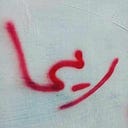Abu ‘Obaidah’s Namesake

The astonishing and, by all accounts, brilliant military victories Hamas has achieved against Israel derive from Islamic history. In school, Arabs learn about Khalid ibn Al-Waleed, “The Sword of Allah,” a military strategist and commander with “very few equals in human history, a man who turned many a defeat or near defeat into glorious victories.” Here is how one of the battles he led is described:
“The battle was a very fierce one, but with their unlimited faith and conviction and with their thirst for martyrdom the Muslims fought fearlessly, to the extent that with a band of only 100 fighters Khalid faced a whole division of many thousand Roman soldiers.”
Khalid ibn Al-Walid fought this battle jointly with two other commanders, companions of the Prophet. One was called Abu ‘Obaidah ibn Al-Jarrah.
The present-day Abu ‘Obaidah, the spokesperson for Hamas’ Al-Qassam Islamic Brigade, is now a symbol of heroism and steadfastness among millions of people, including children. Whereas the aftermath of the October 7th Al-Aqsa Flood operation had the effect of unhinging the Israeli psyche, it served to raise the profile of the heroic history of Islam among millions who proved immune to the demonization of Hamas by Western governments.
Like so many of my fellow Arabs, my sense of pride and identity in Arab culture is derived from the history of Islam (661 to 750 CE) when Muslims conquered more than 11 million square kilometers of territory and ruled over one of the largest empires in history. As taught in schools all over the Arab and Muslim world, the texts of this era instill concepts and values of courage, honor, piety, hospitality and magnanimity in victory as well as humility, equality, justice and even austerity (the much-admired second caliph, Omar Al-Khattab, was a man of few possessions, living modestly and simply among his people). These virtues are so deeply internalized in the minds of Arabs of any religion, they form a parallel culture ever-present, especially among the downtrodden, that contrasts starkly with what many Arab rulers stand for today.
Nothing can tarnish Hamas’s reputation in the Muslim world now, because its fight against Israel is couched, not in the language of settler-colonialism or apartheid or racism or human rights, but in the language of “God’s path,” a path described in the first surah (chapter) in the Quran as:
صِرَٰطَ ٱلَّذِينَ أَنۡعَمۡتَ عَلَيۡهِمۡ غَيۡرِ ٱلۡمَغۡضُوبِ عَلَيۡهِمۡ وَلَا ٱلضَّآلِّينَ
“The path of those upon whom You have bestowed favor, not of those who have evoked [Your] anger or of those who are astray.”
It’s this belief that makes an utterly distraught man, relating to Al-Mayadeen (an Arabic TV news channel) the details of the bombing of his house that killed his daughters, to intermingle his narrative with expressions meant to reassure himself that the wrath of Israel’s raid could not possibly be understood also as God’s wrath. He says, “May God have mercy on my children. May they be considered martyrs. Every Friday, I used to take them to the mosque to pray. I didn’t expect my house to be targeted. I earned my living in a permissible (halal) way under Islamic law.”

In Gaza, people’s faith is being tested in the same way Job’s faith was tested by being subjected to trials and tribulations, including the emotional agony of their children dying. If Satan subjected Job to such trials, who is subjecting Palestinians to them and why?
Israel’s naked sociopathy as embodied by Netanyahu lies in the DNA of the history of its founding through violence and massacres. Israel was created through terror; it is now massacring Palestinian refugees by bombing hospitals, schools, mosques, churches and “infrastructure” over the heads, literally, of its starved and thirsty young civilian population, deprived of electricity and fuel. It is all out for genocide, no less. The USA is a genetic match.
What Israel is doing in plain sight (for who can avoid the daily horrors playing out on our TV screens round the clock as documented by death-defying journalists?) is a serious breach of international humanitarian law. But it isn’t the West’s bankrupt international legal regime that will triumph in the end; it is the power of religion. How else can Palestinians endure the unspeakable? If a calamity befalls them, they say, “We belong to God and to Him we shall return.” (2:156) “Allah is sufficient for me, and He is the best disposer of affairs.” (3:173)
On Al-Mayadeen, we watched Father Anthony Ananias, a monk in the Orthodox Church in occupied Palestine, recite Al-Fatiha — the first surah of the Quran — on the souls of Palestine’s martyrs. Father Ananias, speaking from Damascus, condemned US policy in the region, which he said fomented sectarianism, and Jewish religious voices that call for exclusivity and conquest “in defiance even of their own scriptures.” He recited the Quran to show unity with the Muslim cleric on the program with him, who was speaking from Baghdad.

In a video titled ‘Why Israel is finished; Prepare for Millions to Leave for the West,’ (Nov 10, 2023) Scott Ritter says, “Guess what? Muslim people take their religion just as seriously as Christian people do, just as seriously as Jewish people do.”
In my view, perhaps more so. I couldn’t help but think that when I heard a health worker on Al Jazeera pointing out the Israeli destruction of Al-Nasr Medical Complex. He described the enormity of the consequences of the Israeli airstrike that brought a whole medical complex to a standstill by saying: “By God, I couldn’t find water even to perform my ablution for prayer.”
_________________
Rima Najjar is a Palestinian whose father’s side of the family comes from the forcibly depopulated village of Lifta on the western outskirts of Jerusalem and whose mother’s side of the family is from Ijzim, south of Haifa. She is an activist, researcher and retired professor of English literature, Al-Quds University, occupied West Bank.
